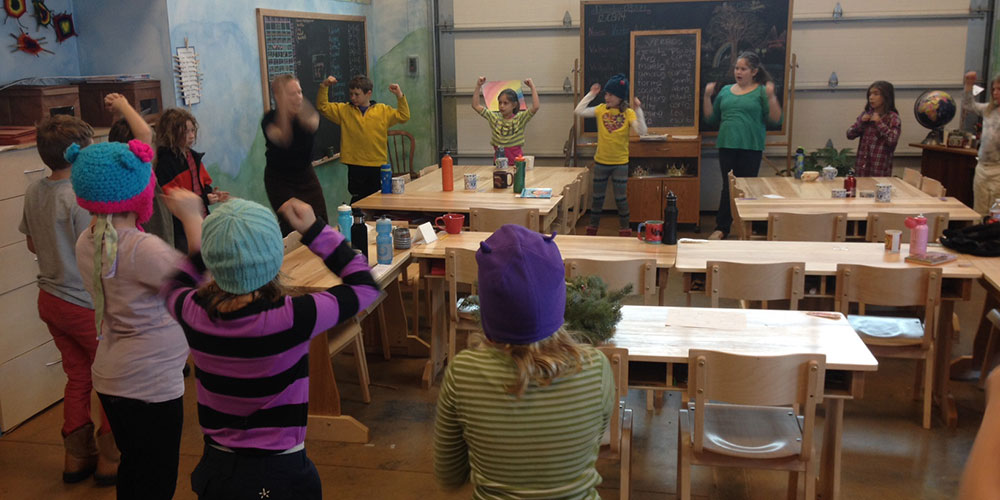“Through the inner flexibility of their speech organ, the children find their way to a flexibility of soul and an openness that has an effect on their entire later life and especially on their social abilities. The foreign language lesson is suited like practically no other lesson to encourage openness and awaken interest for what is foreign to oneself – and in our time of widespread racism and social conflict on both a small and large scale this is a pedagogical mission of the first order” (Forming the Lessons of Grades One Through Eight, Rudolf Steiner College).
The foreign language class follows the same rhythmical way of teaching as the main lesson, following the development of the child through the first through sixth grade. In lesson planning, the class is built by focusing on the head, hands and heart through living images and movement. This enlivens the language, allowing the children learn through the folk life of another culture. The content is brought to the younger student through song, poetry, theater, games and story. In the older grades content is woven through the cultural study of other countries and their cultures.
The following curriculum has been adapted and modified following the guidelines in Andando Caminos: Teaching Spanish in Waldorf Schools:
First and Second Grade Curriculum includes:
- Identify and name colors
- State their name and age
- Count using numbers up to 100
- Addition/Subtraction in Spanish
- Identify and name body geography
- identify and name objects in classroom and animals
- Seasonal vocabulary and nature words
- Descriptive adjectives
- Act out up to 15 verbs
- Chorally retell/re-enact stories in grade 2
- Conversational responses
- Understanding clothing vocabulary
- Choral recitation of finger games/poem and song
- Folk tales from Spanish Speaking countries
Third Grade Curriculum includes:
- Conversational topics: age, name, family, where one lives
- Counting past 100
- Introduce Times Tables in Spanish
- Telling time
- Expanding body geography
- Clothing Vocabulary
- Professions/Actions
- Vocabulary: farm and animals
- Vocabulary: fruit and vegetables
- Parts of house, rooms activities in house
- Months, days of the week, seasonal vocabulary
- Poems
- Family Vocabulary
- Adjectives describing opposites
- Legends from Spanish Speaking countries
Fourth Grade Curriculum includes:
- Review and expansion of vocabulary related to: animals, family, food, house, weather, time and clothing
- Expansion of vocabulary related to the house and family
- Add new animal vocabulary, review animals from fourth grade animal reports
- Food vocabulary/the students learn how to order food in a restaurant
- weather and seasons
- descriptions from the neighborhood
- Vocabulary from town
- Idioms
- Give reports about themselves
- Identify personal pronouns
- Practice writing paragraphs in Spanish and reading Spanish text
- Gender and number of nouns: feminine, masculine, plural and singular
- Define articles: El, la, los, las
- Conjugation of -AR verbs in present tense
- Conjugation of common verbs such as “tener”
- Introduction of verbs “ser” vs. “estar”
Fifth Grade Curriculum includes:
- Review and enhance past vocabulary
- Descriptive adjectives
- School and friends vocabulary
- “Schedule” vocabulary
- Recite poems; take small parts in plays
- Write compositions of 7-10 lines
- Respond to questions about family, house, animals, school
- Using the verb “SER” describe themselves, family, house
- Write/read short paragraphs
- Respond in writing to questions from reading
- Focus on the geography of Mexico and talk about stories and legends from Mexico
- Songs and dances of Mexico
- Introduce the verb ESTAR
- Conjugation of the present tense: verbs with AR/ER/IR endings
- Sentence agreement: article, noun, adjectives
- Review personal pronounds
- Using SER for descriptions
- Introduce irregular verbs: jugar, ir
- Reflexive verbs
Sixth Grade Curriculum includes:
- Review and expansion of past vocabulary
- Cultural and Geographical Studies: South America
- Reading plays from South America
- Parts of the sentence
- Form negative and interrogative sentences
- Writing Compositions and answering questions in both written and oral form from text
- Conversational Skills
- Continue study of SER vs. ESTAR
- Present conjugation of AR, ER, IR verbs, both regular and irregular
- Introduction to Past Tense Conjugation

